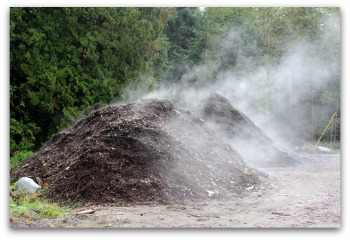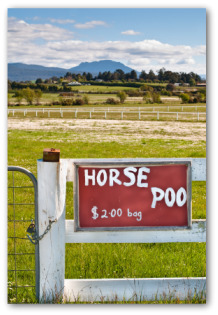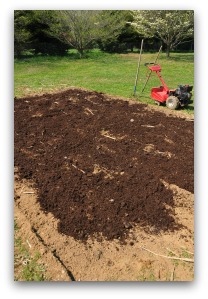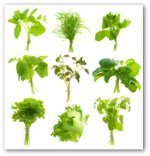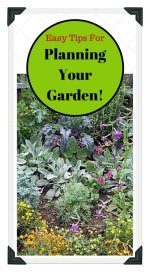Using Horse Manure Compost in Your Home Garden
Check out our easy tips for using horse manure compost when backyard vegetable gardening!
Also, we give tips for how to use horse manure to make a healthy tea for your vegetable garden plants.
Easy recipes for horse manure tea included!
Design Your Own Vegetable Garden Layout Using our Free "Vegetable Garden Planner" Software!
Compost is usually made from partially decomposed organic matter, mostly made up of plants and the manures of plant-eating animals.
Composting with organics such as horse manure compost provides nutrition, improves soil structure, and increases the ability of the soil to hold water.
It also contributes to the general health of plants, moderates soil pH, and encourages healthy soil microorganisms.
In other words, it's good stuff!
Benefits of Composting
Organic materials that are composted properly are about neutral on the pH scale, making it safe to add any amount to the soil without regard to effecting the acidity or alkalinity.
As an added bonus, since most matter used in composting is free, it is the least expensive route to take for soil improvement!
Horse Manure Compost
- Start the compost pile with 5 to 10 inches of leaves, grass, or other organic material.
- Next, scatter a shovelful of horse manure to speed up the decaying process.
- On top of the compost, add another layer of five to ten inches of organics.
- Then a 1 to 2 inch layer of topsoil.Make sure the pile is concave in the middle to prevent water run-off.
- Wet the compost heap with a hose as you add new layers and water every few days when the weather conditions are dry.
Download Free Garden Planning Worksheets, Garden Diary, Zone Chart, Or Planting Guide
For an example, the best compost used for growing everyone's favorite garden vegetable, the tomato, is made by using a four to one mixture such as hay, leaves, plant wastes, and vegetable paring to manure, with a sprinkling of rock powders.
Which Manures are Best for Compost?
One year my dad gave his brother a pick-up load of aged manure from our barn as a birthday present.
I thought it sent a mixed message, but my uncle was thrilled!
The best manures are those that are available to you, and that are free or cheap!
For years, manures were the only source of nutrients and the solely material available to improve a soil's texture.
Now days, most nutritional duties are carried out by concentrated fertilizers.
On the other hand, there is still nothing better for vegetable gardening crops like a layer of manure.
Cow manure is the best but horse manure runs a close second and is much easier for some gardeners to come by depending on your area.
Animal waste such as used for horse manure compost is a key component because it contains lots of nitrogen and plenty of bacteria and other microorganisms to aid the decomposition process.
If you are not able to get manure, you can substitute other materials rich in nitrogen such as cottonseed meal, dried blood, alfalfa meal, or soybean meal.
The drawback is that the substitutes mentioned, do not have the microorganisms found in horse manure.
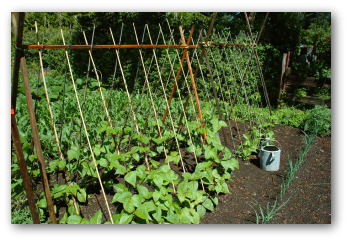 Add Well-Aged Horse Manure to Fertilize Vegetable Garden
Add Well-Aged Horse Manure to Fertilize Vegetable GardenVegetable Gardening Tip for Using Horse Manure
Fresh manure, which can be applied as a top dressing to planting beds in the fall, should never be used in direct contact with plants.
Aged horse manure compost is mixed with soil during preparing the planting beds and as mulch.
Compost Dilemma Solutions
If your compost pile is damp and warm only in the center, the heap may be too small.
Gather more materials and rebuild a larger one.
Another possible cause is too little nitrogen. In that case, add nitrogen source, such as manure or fresh grass clippings.
When animals get into your compost heap, it is usually because meat and dairy products are attracting them.
Avoid adding meats and dairy.
Throw a loose covering such as chicken wire over the pile to deter the pests.
Compost Manure Tea Recipe
Recipe 1:
- Fill an old pillowcase or fabric sack with well-aged horse manure.
- Place the sack in a large bucket or barrel of water for one to 21 days in a well-ventilated area.
Use 1/2 to 1 quart to water vegetable garden plants.
Recipe 2:
- 3-4 gallons of composted manure in cloth bag
- Soak in a large garbage can or barrel of water
- Stir regularly to aerate the mixture
- Remove the bag of composted manure
- Add to the solution1/2 cup of liquid dish soap
- Add 1 quart of Epsom Salts
Apply 1 pint to small sized vegetable plants, and 2 pints to medium sized plants.
Soil Conditioning Secrets for Gardening With Compost
To fertilize the soil for growing the best vegetables in the neighborhood, some gardeners reach for commercial fertilizers.
Other seasoned gardeners swear by Sir Albert Howard's classic Indore method of a layer of dry material, then a layer of succulent materials, capped by a layer of soil, with the sequence repeated to a depth of three to four feet.
You could start a comparison test and use manufactured products on one crop and kitchen wastes, prunings, leaves, and horse manure compost on the other. My money is on the latter for coming in first place!
You Might Also like to Read:
Vegetable Garden Fertilizer